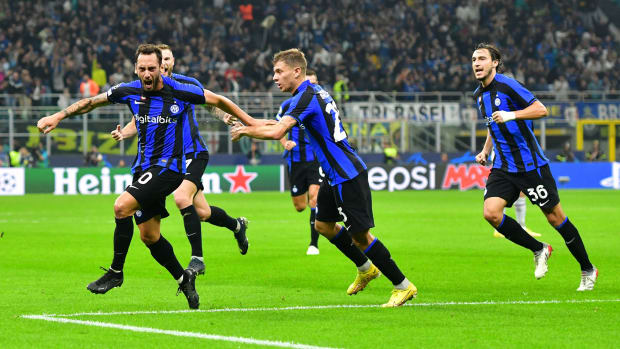Past Reigning Champions Offer a World Cup Warning to France
The assumption had been that Germany would go through. Germany always went through. Germany never messed up this sort of thing. Germany had never failed to make it through the group stage. It had gotten past the first round in every World Cup it had entered since 1938. And yet after 90 minutes of its third group game in Russia, it was drawing 0–0 with South Korea, a result that, with Sweden leading Mexico 3–0, meant Germany was on its way out.
Still, a goal would have taken Germany through, at Mexico’s expense. But when a goal came, it was for the Koreans. Kim Young-gwon looked offside, so far offside that few in the press box in Kazan paid it much attention. But as the replay was shown on the screens, it became apparent that the ball had been played to Kim by Germany’s Toni Kroos. The realization dawned slowly: that was not offside, that was a goal and, with four minutes of injury time already played, Germany needed two to go through. As it was, with Germany piling desperately forward, South Korea added a second and so, for the fourth time in the last five World Cups, the champion had gone out in the group stage.
The root of Germany’s problems wasn’t hard to discover. It had struggled to refresh its squad. Jogi Löw had given a lot of younger players their chances in winning the FIFA Confederations Cup in 2017, but, a year later, he had failed to integrate those players in with the old guard, and the result was divisions in the team. Each of the other three examples (’02 champion Brazil, which reached the quarterfinal in ’06, is the exception) had its own particular issues.

France (2002), Italy (‘10), Spain (‘14) and Germany (‘18) all had their World Cup title defenses end in the group stage.
Imago Images (4)
France had gone on from winning the 1998 World Cup to play even better football in lifting the Euros in 2000, but cliques had developed in the squad, there were rumors of a lack of professionalism from certain players, and injuries to Zinedine Zidane and Robert Pires weakened the collective. After a slightly unfortunate defeat to an ultra-motivated Senegal in the opening game, there was no coming back.
Italy in 2010 also suffered from injuries, with Andrea Pirlo ruled out of the tournament and Gianluigi Buffon being forced off in the first game. Winning in ’06 had been a slight surprise, and Italy’s level had dipped with the departure of Marcelo Lippi as manager. He returned for the World Cup and trusted many of the heroes of ’06, which perhaps contributed to a sluggish campaign of draws against Paraguay and New Zealand before the crushing defeat to Slovakia. Italy finished last in the group.
Watch the World Cup with fuboTV. Start your free trial today.
For Spain in 2014, the issue was similar: After three tournament wins in a row, there was perhaps a sense too much had remained the same, certainly since Vicente Del Bosque had replaced Luis Aragonés as manager after success at Euro ’08. Opponents had begun to work La Furia Roja out, and the use of a back three, as was deployed by both the Netherlands and Chile, could allow the use of an extra midfielder to swamp Spain, the way direct runs behind the defensive line—Arjen Robben was used almost as a central forward by Louis van Gaal—could expose a less-than-rapid back line. A 5–1 defeat to the Netherlands proved impossible to recover from and was followed by a 2–0 defeat to Chile before a face-saving but largely irrelevant win over Australia. Its title defense lasted two games.

France will try to become the first men’s team in 60 years to repeat as World Cup champion.
Pierre Stevenin/ZUMA Wire/Imago Images
What then, are the lessons for France going into the World Cup in Qatar, where it will aim to avoid catastrophe? The biggest problem, perhaps, is the most natural one: When a team has been successful, there is an understandable reluctance to change, particularly when the manager remains the same. The tendency is to trust those who have stood up under pressure before.
France may have only 10 World Cup winners on its 26-man squad (it would have been 11, but Presnel Kimpembe was forced to withdraw with an injury), but the XI that begins the World Cup against Australia on Nov. 22 will probably feature between five and seven players who played regularly in Russia. But for the injuries to N’Golo Kanté and Paul Pogba, which have ruled them out of the competition, it would be even more.
(Editor’s note: References to Karim Benzema originally published in this story have been removed, now that Benzema has been ruled out for the competition with an injury.)
In addition, it’s easy to see where splits in the squad could occur. Kylian Mbappé has proved at times to be a difficult character. Adrien Rabiot can be awkward, and his mother was involved in a row with Mbappé’s parents at the last Euros. Manager Didier Deschamps was not progressive even in victory; like Löw and perhaps others, he could find that football has left him behind.
France has a preposterous array of talented players, no matter the growing injury list. A second string would have a decent chance of winning the World Cup. It could easily retain the trophy, something no men’s team has done since Brazil 60 years ago (1958, ’62). But the warning signs are there—and history suggests being champion is a far-from-straightforward role.





